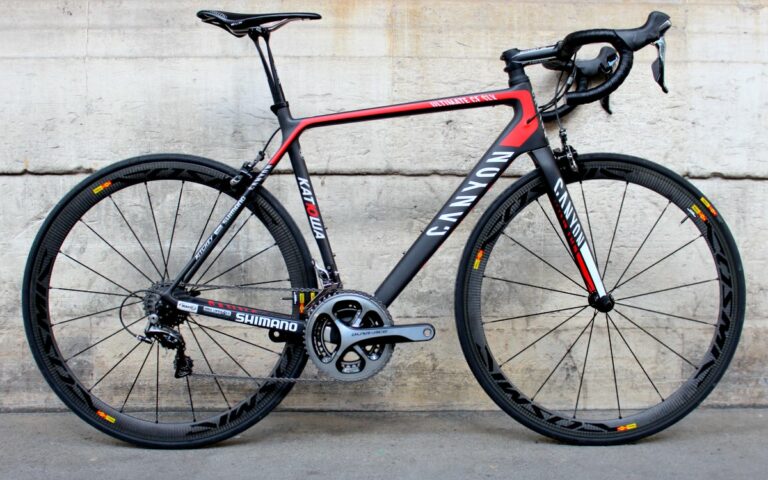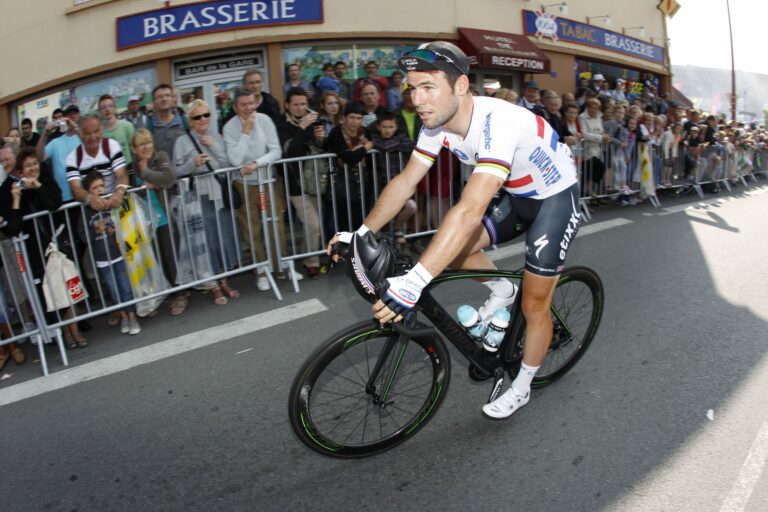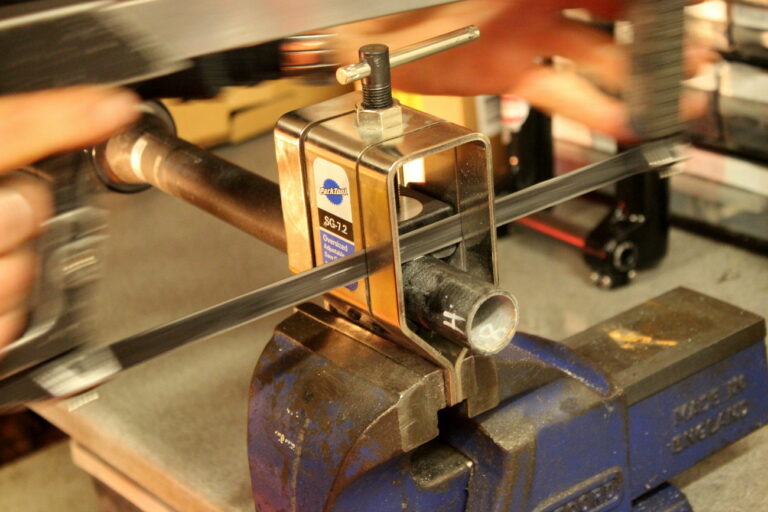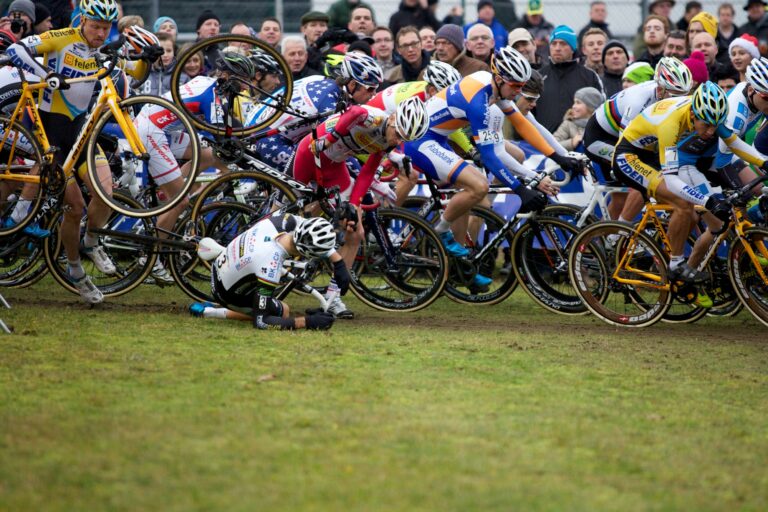Christmas 1986.
A teenaged Ian Whittingham is glued to a one-hour highlights package of the Tour de France. He doesn’t know it yet, but the 60-minute summary of the Titanic struggle between Greg LeMond and Bernard Hinault for victory in the greatest of all bike races will change his life forever, setting him on a path with friend and neighbour, Jason Turner, to ownership of a bike shop that Whittingham tells RoadCyclingUK with perfect sincerity has raised the bar for the industry. Few who have visited Sigma Sport’s multi-million pound premises in the Surrey town of Hampton Wick would disagree.
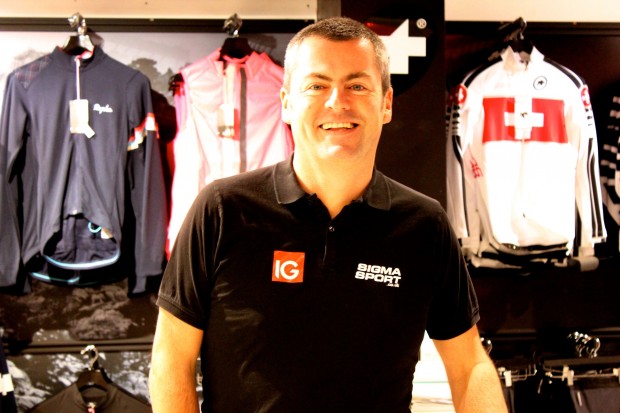
Satisfyingly, their story is of two entrepreneurs who began making their own luck as teenagers with freight ferry crossings from Belgium in a Vauxhall Nova laden with cycle components and surrounded by juggernauts. It is a story of expansion from Saturday morning sales from Turner’s bedroom to a 9,000 square foot former office block, converted to a ‘destination store’ at a cost of £1m.
Even now, three years later, I have that kind of wonderment and think, ‘Wow. This is our bike shop’. Without wishing to sound arrogant or to blow our own trumpet, I think we’ve genuinely raised the bar for cycle retail – Ian Whittingham
Twenty years after starting as cycle retailers in a former greengrocer’s shop, last year the pair found themselves frantically rigging up television screens on the pavement outside their new shop as Bradley Wiggins flew past en route to an Olympic gold medal, unable to squeeze any more people inside the three-storey premises. Despite ascribing to the theory that the best way to leave the cycle trade with £1m is to begin with £2m, Whittingham tells RCUK he is the most confident he has been for three years. “Cycling’s in a great place,” he says, “and it’s only going to get better”.
From tiny acorns…
Sigma Sport has grown from humble beginnings. Filling time in temp jobs, Whittingham and Turner sought alternative methods of increasing their income. A key-chain device for automated telephone dialing delivered their first commercial success. By holding the device to the mouth piece in a telephone box, the proud owner could make calls free of charge. “We didn’t know that!” Whittingham laughs. Sales through the Innovations catalogue rocketed, and having discovered the secret of the device’s success, the enterprising pair booked space in the classifieds section of the Daily Mail. “We used to say in our ads, ‘It’s illegal to make free telephone calls from public telephone boxes,’” Whittingham chuckles, “i.e. this is what you need to do it.”

His growing love of cycling made the sport the next target for the young entrepreneurs. Having learned that British mail order companies were sourcing stock from Belgium, the duo headed to Belgium’s largest retailer: Plum’s of Gent. Sensing no commercial rivalry from two teenagers from London, the owner willingly disclosed the details of his suppliers. Early successes included becoming the importer for Descente clothing and the new ‘tri bars’, thrust into the public conscious by LeMond’s victory in the 1988 Tour.
We’d go over on a passenger ferry, but come back very often on a freight ferry, and they’re very, very different beasts. It would be a bunch of juggernauts and us in a Vauxhall Nova – Ian Whittingham
These early victories were “enough to put a little advert in the back of Cycling Weekly. We took that advert and a bunch of Belgian francs and started trading with the Belgian wholesalers. We were going over in a Vauxhall Nova and filling it up as best we could.”
With no access to funds other than those generated from sales, and with their Belgian suppliers insisting on cash payments, investments were modest and trips frequent. The Eurotunnel was still some two years from opening, and so trips to the Continent were made by boat. “We’d go over on a passenger ferry but come back very often on a freight ferry, and they’re very, very different beasts,” Whittingham recalls with a smile. “It would be a bunch of juggernauts and us in a Vauxhall Nova. We’d go into the drivers’ canteen and they’d be serving up tea and toast, and every other guy was a mullet-ed Dutchman, and there was me and Jason.”
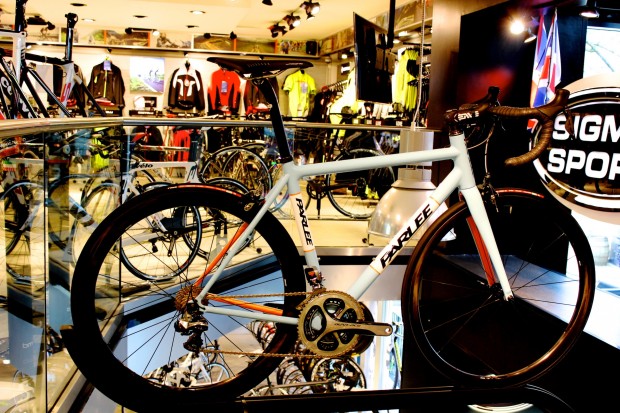
“We were still working, so we’d often take two days off, go to two of these wholesalers on Thursday morning, stay Thursday night in Gavere in Belgium, near the Stella Artois brewery, go out, have a few beers, sleep in the car (which was by that time full of stock, so we didn’t want to leave it anywhere), get up in the morning, clean our teeth in the flower beds in the local market square, and go off to the other wholesalers.
The analogy I use is that we’ve gone from being a bike shop to a business. We employ over 50 people; we had 13 in 2009. It’s been pretty massive growth – Ian Whittingham
“We’d come back on the freight ferry in to Dover, then do the whole custom clearance process, pay the VAT and duty in cash, get back in the early hours, and then sell it through the advert in Cycling Weekly. It was great fun. We used to love those trips.”
Saturday mornings at the Turner household have become a cherished part of the Sigma Sport legend. As well as selling their stock from the classifieds advert in Cycling Weekly, Turner’s bedroom would become the duo’s first retail outlet. “We used to have a queue of callers along the hallway and down the stairs, and Jason’s mum would be coming along with cups of tea. It was just a way for two young guys, 17, 18, 19, to get started, and build a little bit of a base, so we could get a shop.”
First time buyers
The first shop opened on July 4, 1992, a 400 square foot former greengrocer’s in the Surrey town of Hinchley Wood, near Esher. Sigma Sport was born. Why “Sigma Sport”? Determined not to pigeon hole themselves as a cycle shop in an era witnessing the birth of triathlon, “sport” seemed a better option than “cycles”, and offered a nod to Box Hill’s Dauphine Sport. And Sigma? “It seemed to sit quite well on the downtube of a bike,” says Whittingham, “and the little Greek ‘e’, we thought that looked good as a headtube badge.”
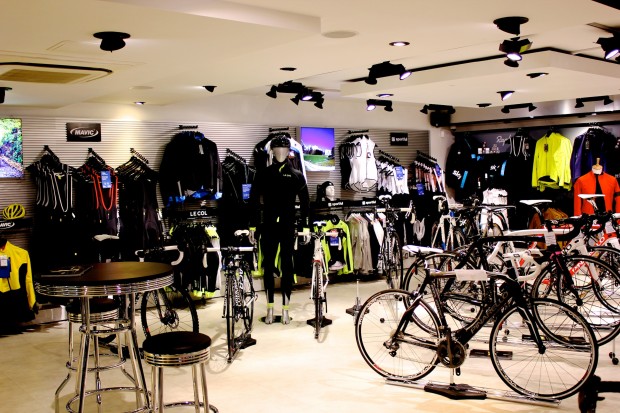
Neither had worked in a bike shop, and set up with Turner as mechanic and Whittingham as salesman. “In the evenings we’d do the paperwork and work on adverts. Throughout the day we’d work on mail order too, so by 2pm our little shop would have packages all around the floor and we’d whizz them down to the post office.” The pair would continue to operate as a two-man band for the first two-and-a-half years, with one part-time member of staff joining them at weekends. “We’re two very different characters,” Whittingham says of his business partner, “which is why, 22 years later, we’re still going strong as a partnership.”
Destination store
The shop in Hampton Wick is the centre of the Sigma Sport operation. The web shop and Specialized Concept Store in nearby Kingston are important parts of the business, but for most of their customers the embodiment of Whittingham and Turner’s business is the 9,000 square foot, three-storey building – a premises as far removed from the traditional bike shop as can be imagined. “Even now, three years later, I have that kind of wonderment and think, ‘Wow. This is our bike shop,’” Whitingham says. “Without wishing to sound arrogant or to blow our own trumpet, I think we genuinely raised the bar for cycle retail. I’ve spent as much time showing fellow members of the trade around the place as customers.”
If you tag on the concept store, we’ve now got about 13,000sq ft of retail space: almost 10 times more than we had in 2009 – Ian Whittingham
Partnership with an investor in 2009 and the subsequent sale of half of their shares to him allowed Whittingham and Turner to plough the proceeds into a multi-million pound investment to buy their longed-for premises and complete the conversion required to turn an office block into a bike shop. The refurbishment, headed by Turner, coincided with Whittingham turning the Kingston premises that is now the Specialized Concept Store from a “shell” to a shop. “If you tag on the concept store, we’ve now got about 13,000sq ft of retail space – almost 10 times more than we had in 2009.”
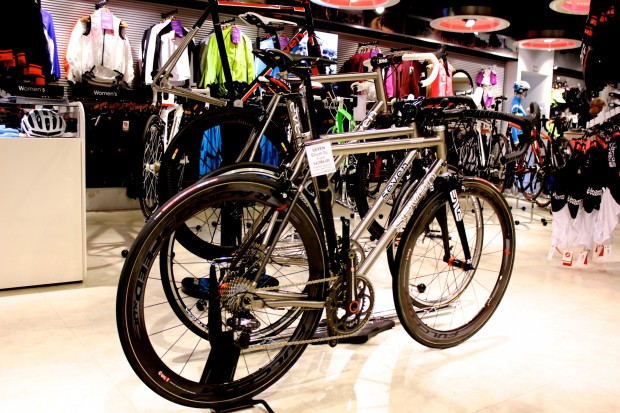
Despite the obvious advantages of trading from such impressive premises, Whittingham insists that the massive expansion that accompanied the move has brought its own challenges. “The analogy I use is that we’ve gone from being a bike shop to a business,” he says. “We employ over 50 people; we had 13 in 2009. It’s been pretty massive growth.”
Bricks and mortar vs. virtual retailing
The independent bike dealer has faced two conflicting forces in recent years: the seemingly unstoppable rise in cycling’s popularity, and a similarly unstoppable growth in on-line sales. “The reality of being a retailer in general is that it’s hard work. Take your foot off the gas for even one second, and you’re going to lose ground,” Whittingham warns. The oft-repeated mantra that local bike shops must shift their business model from sales to service to survive he believes is too simplistic. Whittingham describes the Sigma Sport offering as a package. The challenges of running “a high-overhead model” and attempting to compete on price with on-line players should not be underestimated, he says.
The reality of being a retailer in general is that it’s hard work. Take your foot off the gas for even one second, and you’re going to lose ground – Ian Whittingham
“We want all our customers to feel loved, we want them to use us as their default, and we want to give them a reason to do that, but that’s a really difficult combination to deliver and it takes a lot of work,” Whittingham says. He identifies brands, staff, and enjoyment as key ingredients in the Sigma Sport mix. “For us, it’s the complete package. We have to make sales to survive. We have an investor who eventually will want to see a return on that investment. It’s a combination of all of the above, and keeping it fun as well. If we’re having fun, our customers are having fun. It’s vital we try and offer a bit of all of that.”
For a business that started with mail order, Sigma Sport has been “late the party” with its on-line offering, Whittingham admits; a phenomenon only embraced fully in the last three years. There is no desire for this area of the business to take over the world he adds, describing SigmaSport.co.uk as “a nice to have”.
C is for cyclist, C is for community
Pressure from internet retailers has made independent bike shops focus more intently than ever on their role in local cycling communities. Whittingham agrees fervently: the Hampton Wick store is “all about community,” he says. Last year’s Olympic time trials, when the world’s best riders passed within 20 metres of Sigma Sport’s doors, provided a tangible example of the store’s position in the imagination of London and Surrey cyclists, who gathered on the pavement outside the shop throughout the day to join the thousands pressed against the barriers lining the route, many staying until late evening to enjoy the bbq held at the adjacent pub.

“I don’t think we could have squeezed another person into the shop,” Whittingham remembers. “Once Bradley Wiggins had gone past, the amount of people who flooded into the store was bonkers. I remember looking and thinking, ‘This is just incredible’. If I hadn’t taken a penny through the till that day, it wouldn’t have mattered – that wasn’t what it was about. It was our 20th anniversary last year and you couldn’t ask for a better present than to have the Olympics passing your front door.”
Whittingham proudly recalls another moment in which Sigma Sport played “a tiny, tiny part” in Wiggins’ success, supplying him for a few weeks with a bike while he waited for his then team, Francais de Jeux, to provide a steed of his own.
Team players
Having begun as a rider, and with a need to promote the business, in particular a new range of Italian-made, Sigma Sport frames, sponsoring individual riders and then entire teams was a logical development for Whittingham. Early successes came from triathlon, with Tim Don and Andrew Johns among those to deliver success.
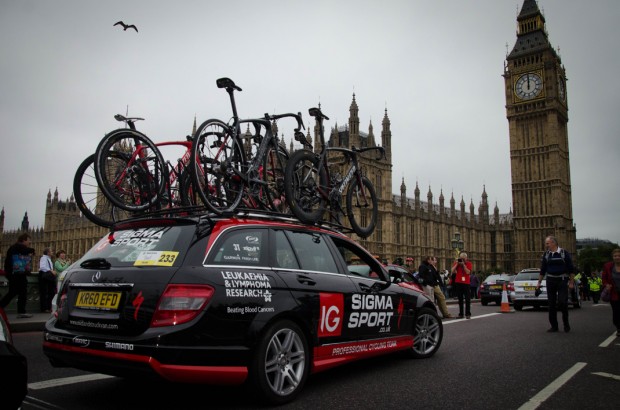
The rise of Sigma Sport’s men’s road team from Surrey League events to the Tour of Britain is perhaps deserving of another article, but its success can be boiled down to the recruitment of former British champion, Matt Stephens, firstly as a rider, having found himself, like Bradley Wiggins, without a ride following the collapse of the ill-fated Linda McCartney squad, and later as rider-manager.
If you’re in retail, then being in cycle retail is probably a better place than most. There will always be a space for a good local bike shop – Ian Whittingham
Whittingham uses the word “catalyst” to describe Stephens’ role in the team’s graduation to the UCI Continental ranks with the aim of racing in the Tour of Britain. You can read more on the team’s struggle to find a joint title sponsor for the 2014 season here, but Whittingham is clear on the financial demands of running a team, and of the rewards of racing in the Tour of Britain.
Next steps
Retailers will continue to have a tough time, Whittingham believes, “but if you’re in retail, then being in cycle retail is probably a better place than most. There will always be a space for a good local bike shop.” He predicts a sharp demarcation between the traditional cycle retailer and the “destination store” model that Sigma Sport has pioneered in the sector. “I’m just not sure there’s room for a lot else,” he concedes. “That’s my feeling. You’re going to be one or the other.”
And for cycling? Whittingham foresees road cycling consolidating its position in the national conscious with events like RideLondon, and a resurgence in mountain biking as those attracted to two wheels by the road cycling boom seek further avenues for their passion. “Cycling’s in a great place and it’s only going to get better,” he says. After 20 years in the game, Whittingham’s opinion is worth hearing.

